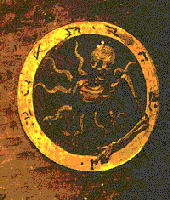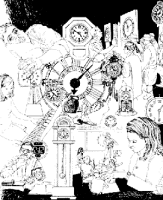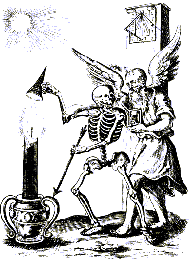--De Santillana
"Only time (whatever that may be) will tell."
--Stephen Hawking

Why is it that modern society is so interested in the concept of building a time machine, therefore allowing an overlap of past, present, and future?
One answer could be our need to escape the rapid pace of modern time. To see how a reaction to social conceptions of time could place within the realm of mythology, we must look at the changing interpretations of time through history, and their representation in religion and story.
GREAT TIME
-Bhagavad Gita
 A myth is an explanation, an interpretation of the world, written from within a set of social and religious ideas. True myths are timeless. Their ideas come from places and ages the Western mind cannot understand. Words and characters become immortal. King Arthur, for example, will forever live in the depths of the lake where Merlin sent him.
A myth is an explanation, an interpretation of the world, written from within a set of social and religious ideas. True myths are timeless. Their ideas come from places and ages the Western mind cannot understand. Words and characters become immortal. King Arthur, for example, will forever live in the depths of the lake where Merlin sent him. Greek mythology describes an eternal, heavenly home for their immortal gods. Chronos was their god of time. Like the Greeks, other ancient cultures (such as the Maya, aboriginal Australian, and Egyptian peoples) believed and wrote about a cosmic, eternal time where their gods resided. You may be thinking that religions today, take Christianity for example, still have a separate, heavenly time. However, there is a difference.
CIRCULAR TIME
--Aristotle
 Some cultures such as the Greek saw time as cyclical - everything was re-born, every event would occur again. There was no ending. For this reason, their idea of "eternity," where the gods resided, is entirely different than the Christian idea of "heaven." Heaven is the termination of life, as we know it, the shift to an eternal location of reward for the soul. A believer in Christianity is not re-born - he or she stops existing entirely on Earth. Also, the opposing location of Hell eliminates the concept of punishment as a part of life.
Some cultures such as the Greek saw time as cyclical - everything was re-born, every event would occur again. There was no ending. For this reason, their idea of "eternity," where the gods resided, is entirely different than the Christian idea of "heaven." Heaven is the termination of life, as we know it, the shift to an eternal location of reward for the soul. A believer in Christianity is not re-born - he or she stops existing entirely on Earth. Also, the opposing location of Hell eliminates the concept of punishment as a part of life. Eastern religious beliefs deserve special mention, not only because are they still practiced, but also because they are beginning to have attraction and influence on certain circles of the Western culture. The concept of "great time" receives even more emphasis due to the massive scale of their historical mindset. Unlike the individualist ideology to which were accustomed today, these believers are individually insignificant next to the lives they had been and would become. This can be demonstrated through the story of a Hindu myth. It is the story of Indra, who is the King of the gods. Indra becomes consumed with pride and vanity, but is put in his place by a small boy who says, "I saw the ants, O Indra, filing in a long parade. Each was once an Indra. Like you, each by virtue of pious deeds once ascended to the rank of a king of the gods. But now, through many rebirths, each has become again an ant. This army is an army of former Indras..." It is interesting to consider the effects this mindset might have -- for example, an emphasis on the continuation of the species rather than on the exceptional status of an individual.
LINEAR TIME
--Plutarch
 With the inevitable rise of Rome and Christianity, the dominant Western idea became that of time as a straight line. This theory made possible the conception of history, as we know it.
With the inevitable rise of Rome and Christianity, the dominant Western idea became that of time as a straight line. This theory made possible the conception of history, as we know it. The two primary mythic figures of Christian time are Father Time and Father Christmas. Father Time is most noticeable as a presence in paintings and stories in the 17th century.
 He usually holds an hourglass, which can represent his relation to technology and progress, as opposed to earlier time gods (such as Cronos), who hold agricultural tools. Father Christmas, a modern version of St. Nicholas, marks the end of each year, the progression of time. Like past time gods, his presence represents the progression of the years, and makes us think of our mortality. In his book Patriarchs of Time, Samuel Macey points out the interesting combination of this figure of time with the materialistic holiday that Christmas has become. He justly observes that "in an increasingly bourgeois society we recognize that time is money, and that we must value both for our material well-being." In his opinion, this is what time has come to represent.
He usually holds an hourglass, which can represent his relation to technology and progress, as opposed to earlier time gods (such as Cronos), who hold agricultural tools. Father Christmas, a modern version of St. Nicholas, marks the end of each year, the progression of time. Like past time gods, his presence represents the progression of the years, and makes us think of our mortality. In his book Patriarchs of Time, Samuel Macey points out the interesting combination of this figure of time with the materialistic holiday that Christmas has become. He justly observes that "in an increasingly bourgeois society we recognize that time is money, and that we must value both for our material well-being." In his opinion, this is what time has come to represent.
Linear time is carried out into modern beliefs. However, it differs slightly from Christian time, because it extends before and beyond the human. The image of time has become the marching on of minutes, hours, and days. The mass production of clocks occurred at the same time as the Industrial Revolution in England, between 1660 and 1760. Since then, we have become aware of increasingly smaller and smaller divisions of time. If you want to know the exact time to the second, for example, you can just visit the U.S. Naval Observatory.
TODAY'S TIME
-St. Augustine
 So what does this imply about today? In a media-driven nation, is the myth bound to be more complex? Or is it more marginalized in the search for true information?
So what does this imply about today? In a media-driven nation, is the myth bound to be more complex? Or is it more marginalized in the search for true information?
J.B. Priestly, the author of Man and Time, states that the myths of today take place within the realm of science fiction. One of the themes most consistently represented in science fiction is that of time travel. Today's myth, then, presents the story of escape from and rebellion against the modern progression of time. This can be beneficial, as it allows a sort of mental return to circular time, in which the individual does not die, but is immortal. It can also be dangerous, if we lose motivation to use the time we have in a beneficial way as we instead search individually for removal from it.
A good place for more information on mythology is Brewer's Dictionary of Phrase and Fables.